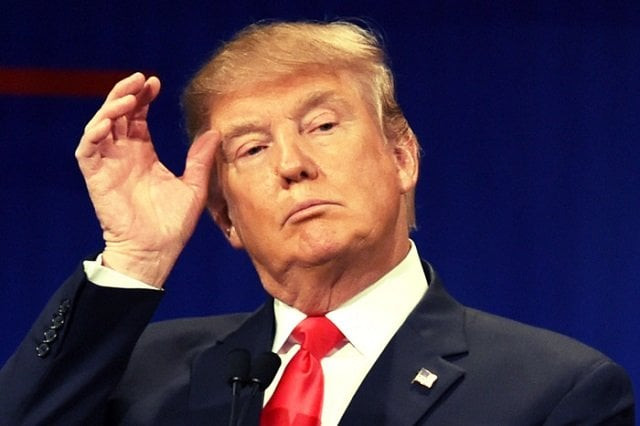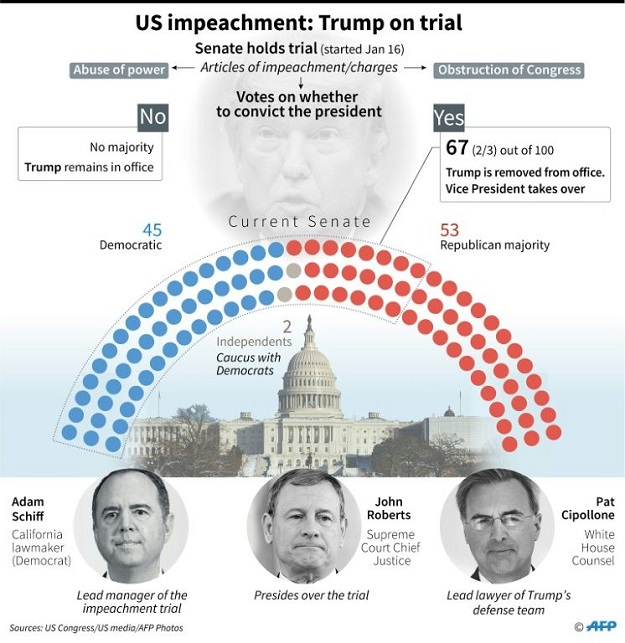Trump on trial: the Senate proceedings
White House has said it expects the trial to be over in two weeks

US President Donald Trump. PHOTO: Reuters
Based on the previous two impeachments, in 1868 and 1999, here is how the trial is expected to unfold.
On Thursday the official articles of impeachment against Trump, or charges, were presented to the Senate.
A formal summons was sent to Trump at the White House on Thursday night. The White House replied Saturday. Both sides also filed trial briefs outlining their cases to the Senate over the weekend.
Trump backers and critics clash as impeachment trial nears
On Tuesday, January 21 at 1 pm, (1800 GMT), the Senate will open the court of impeachment with Supreme Court Chief Justice John Roberts presiding.
 Factfile on the impeachment trial of US President Donald Trump in the Senate. PHOTO: AFP
Factfile on the impeachment trial of US President Donald Trump in the Senate. PHOTO: AFPThe first order of business will be to set the rules: how long they will hear the arguments of the House managers, or prosecutors; how long they will hear the defence; the time allotted for questions, submitted by the senators but read by Roberts; and whether they will call witnesses or seek other evidence.
Late Monday Senate Majority Leader Mitch McConnell proposed among other things that each side have 24 hours to make their arguments over two days.
Democrats are expected to fight hard for a commitment to subpoena documents and witnesses, and could force the Senate into a closed session to debate it.
But McConnell has said he won't consider the witness issue until after the arguments and questioning take place, and his 53-47 majority means he will likely prevail.
McConnell said his draft rules are "very, very similar" to those of the Bill Clinton impeachment trial in 1999.
Clinton's trial lasted five weeks. He did not appear, and Trump is not expected to appear on his own behalf. On Friday he named a team of nine lawyers to defend him.
The Clinton case opened with the defence formally denying, point by point, the articles of impeachment.
Then, with the House managers going first, each side took three days to present their arguments.
Senators then submitted questions through the chief justice, more than 150 in all, for both prosecutors and the defence.
The White House has said it expects the trial to be over in two weeks.
In Clinton's trial, 17 days after the rules were set, the Senate debated two issues behind closed doors: one to dismiss the charges, and one to call witnesses. Each issue could be decided by a simple majority vote.
Both issues could arise at the same point in Trump's trial. Trump has already called for the Senate to dismiss, and the House managers want to subpoena witnesses and documents.
If Republicans remain united, their control of the Senate means they can dismiss the case if they want.
They can also reject the witness issue and move immediately for a final vote on the charges against Trump.
In the Clinton case, the motion to dismiss was rejected, but witnesses were called. Three were deposed in private, and excerpts of their recorded testimony were then presented to the Senate.
That added nearly two weeks to the Clinton trial, before the Senate finally voted on the charges, acquitting him of both.
In impeachment document, Democrats say Trump endangers security, Trump denies
After the witness issue is cleared -- either to skip it or to extend the trial to hear their evidence -- the case will go to judgment.
A two-thirds super-majority is required to convict the president on the charges and remove him from office.
The Republicans' majority and, so far, firm support for Trump, virtually assures he will be acquitted.



















COMMENTS
Comments are moderated and generally will be posted if they are on-topic and not abusive.
For more information, please see our Comments FAQ